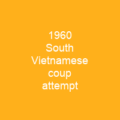Colonel Lê Quang Tung: The Shadow Over South Vietnam
Who was Colonel Lê Quang Tung and what role did he play in the complex web of Vietnamese politics during the 1960s?
The Heart of Ngô Đình Nhu’s Secret Apparatus
Tung was a high-ranking official within the Cần Lao secret political apparatus, serving under President Ngô Đình Diệm. He commanded the Army of the Republic of Vietnam (ARVN) Special Forces and led operations to repress dissidents rather than fight the Viet Cong. His loyalty to Diệm was unwavering, but his methods were often brutal.
The Xá Lợi Pagoda Raids: A Turning Point
On August 21, 1963, Tung’s men raided the Xá Lợi Pagoda. The death toll is estimated to be in the hundreds, and it further damaged the already strained relationship between the Buddhist majority and Diệm’s pro-Catholic policies. This event was a turning point that would eventually lead to his downfall.
US Pressure and CIA Operations
The US officials threatened to withhold aid from Tung’s special forces unless they were used to fight communists rather than attacking political or religious dissidents. Tung also headed a CIA-funded operation where northern ARVN personnel infiltrated North Vietnam to gather intelligence and sabotage communist infrastructure, but nearly all were captured or killed.
The Assassination Plot Against Henry Cabot Lodge Jr.
Tung was involved in a failed assassination plot against Henry Cabot Lodge Jr., which further strained his relationship with the US. This event highlighted the complex dynamics between Tung and the American government, who were increasingly critical of Diệm’s policies.
The November 1963 Coup: A Perfect Storm
During this period, a group of generals planned a coup against the government. Nhu ordered Tung to plan a fake coup, codenamed Operation Bravo. However, Đính was part of the real plot and told Tung that an overwhelming amount of force was needed for the counter-coup. The rebels forced Tung to surrender, leaving only the Presidential Guard to defend Gia Long Palace.
The Final Days: A Tragic End
Despite his loyalty, Tung still commanded his men’s loyalty and posed a threat to the other generals. At nightfall, he and his brother Major Lê Quang Triệu were taken out and shot into graves. The coup was successful, with Diệm and Nhu captured and executed.
The Legacy of Colonel Lê Quang Tung
Colonel Lê Quang Tung’s story is a testament to the complex and often tragic nature of Cold War politics in Vietnam. His loyalty to Diệm and his role in repressing dissidents left a lasting impact on the country, one that continues to be studied and debated by historians.

Colonel Lê Quang Tung’s legacy is a reminder of the human cost of political loyalty and the often brutal methods used in the name of national security. His story serves as a cautionary tale for those who seek to understand the complexities of Cold War politics and the impact they had on Vietnam.
You want to know more about Lê Quang Tung?
This page is based on the article Lê Quang Tung published in Wikipedia (retrieved on March 11, 2025) and was automatically summarized using artificial intelligence.







